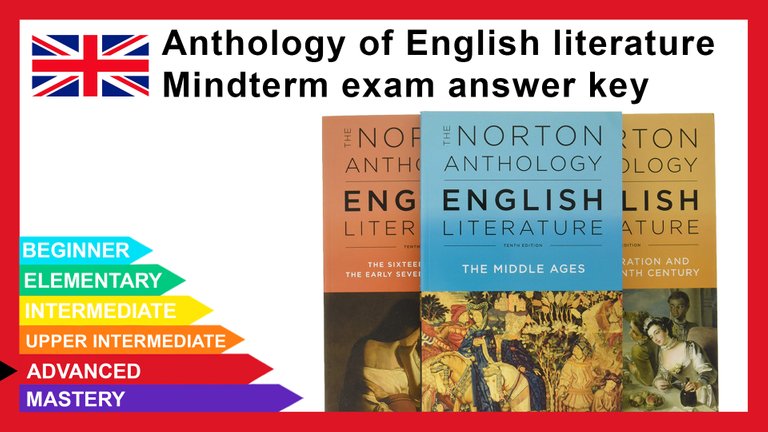
Hello everyone. I'm glad that I am creating content again after almost 6 months of inactivity. I've been really busy these days with work and university. I study English language and literature, and tomorrow I have an exam: Anthology of English literature Part 2. The source of this exam is the Norton Anthology book. Here is a list of 4 questions that will probably appear in the exam, with their answers that I've found in the book:
1- Name different Schools of Novel. Elaborate on two of them and support your discussion with appropriate examples.
Part A:
- Romanticism 2. Realism 3. Naturalism 4. Impressionism 5. Expressionism 6. Existentialism
Part B:
Romanticism: A literary and philosophical theory that tends to see the individual at the very center of all life and all experience. Romantic Novel is marked by a strong interest in action, love, and adventure. The term 'Romantic' is used to mean subjective, emotional, and idealistic. Sir Walter Scott is the most famous writer of romantic novels.
Realism: Realism is a reaction against romanticism, and removes the romantic qualities of a novel, and deals with the actual reality as it is :the truthful treatment of the material. Realism can be considered as middle-class art, which describes the common, average, everyday life. Henry James and George Eliot are two of the best realist writers.
2- Elaborate on the Rise of Neo-Classicism and name at least five tenets of Deism.
Part A:
- The term Neo-Classicism is applied to the Classicism which dominated the Restoration-18th-century literature. It is based on Classical literature and contemporary French Neo-Classicism, with a view of man as a limited, dualistic, and imperfect creature. Neo-Classical poetry favors clarity, simplicity, and good sense. Ben Johnson is the most significant writer of Neo-Classicism.
- The Bible is not the inspired word of god. 2. God is the creator and governor of the universe. 3. The origin and truth of religion may be scientifically investigated. 4. Human beings are free agents who can act as they choose and are responsible for their choice. 5. Man is a rational creature who can understand the laws of nature.
3- How do you compare the tenets and doctrines of Neo-Classicism and Romanticism? Elaborate on them completely. (You need to elaborate on each completely.)
Classicism stands for objectivity, stability, restraint, the dominance of reason, sense of form, unity of design and aim, respect for tradition, and the like.
Romanticism rejects almost all such values. Instead, they favor subjectivity, change, freedom (in thought, form, and design), imagination and intuition, emotion and feeling, symbolism and myth, individualism, imperfection, rejection of literary tradition, invention and originality, love of outside nature, mysticism, and the like.
4- Explain William Blake's style and attitude in Songs of Innocence & Songs of Experience and write about “The Lamb” and its counterpart “The Tiger” in detail. Write about William Wordsworth`s viewpoints and literary style and what is his most important obsession in one of his most famous sonnets “The World Is Too Much with Us”?
In his Songs of Innocence and of Experience, Blake shows the two contrary states of the human soul. Blake is a satirist with organized thought. The songs of innocence sets out an imaginative vision of the state of innocence, and The songs of experience shows how life challenges, corrupts, and destroys innocence.
The lamb is used to describe a humble and innocent creature, while the tiger represents a harsh, tainted, and powerful creature. The author uses these two animals to express the nature of humanity by describing how people change from innocent children to bitter and resentful people.
William Wordsworth was a romantic poet. He saw nature as the source of inspiration. In his work The world is too much with us, Wordsworth shows how people are too much involved in everyday material life and away from the beauty of nature.